Help! My little one often drifts off in my arms when I read him a story at the end of our nighttime routine. Before, I was able to transfer him to his crib and he’d go to sleep straight away. Now, when I try and put him down, he wakes up fully and cries until I pick him up again. Is there anything I can do?
Try… Putting him to bed when you notice he is getting tired, and before he falls asleep. Settle him with his favorite soft toy, and be close to soothe him. Your toddler may be relying on being held while he falls asleep, and is having trouble falling asleep on his own. In that case, you may need to hold him close so that your toddler feels reassured by your presence without necessarily needing to be held. Keep checking on him if you need to. It might not work the first time, but keep trying to get into a regular routine and, over time, he’ll learn to fall asleep on his own.
Help! It’s getting increasingly difficult to get my toddler to go to sleep when I tell him it’s time. What started out as a request for one more story has now progressed to about three more stories, a drink of water, and as many stuffed animals as he can fit in his crib! The list goes on.
Try… Pre-empting some of his requests and working them into his regular bedtime routine to keep him happy. This behavior is common, and a sign of your toddler becoming more independent. He’s developing a mind of his own, and learning how to test boundaries. Be sure to recognize what is happening and set limits on his demands.
Help! My toddler used to sleep through the night, but now he's waking up crying and wants me to hold him. I'm really tired and don't know what to do. Any advice?
Try… Reassure your little one that you're nearby. Changes in routine like illness, travel, or a new bedroom environment can cause night waking. If he's in an unfamiliar place, he might need extra comfort. Try not to pick him up every time, as he might rely on it to fall asleep. If he's been sick, he might be used to extra attention at night. Since his usual bedtime routine has been disrupted, gradually return to the pattern that was familiar for him.
Help! My toddler still has two naps a day—I know I should probably reduce this to one, but I find those “bonus hours” when he’s asleep during the day really useful for getting chores done. Is this OK to continue?
Try… Taking cues from him about napping. If he is still taking two naps and sleeping well at night, there is no need to make any changes. Its important to know that the recommended sleep duration for toddlers is between 10 to 14 hours including naps ( 2 year old- 11 to 14 hrs; 3 to 5 yrs- 10 to 13 hrs).
Help ! Could you kindly give me some tips to help my child sleep better?
Establishing good sleep hygiene means developing habits that help toddlers to get good sleep. You can put your toddler to sleep at the same time every night. This helps his body remember to feel sleepy. If possible, have a separate room/area for sleep, a quiet environment, with dimmed lighting and a comfortable room temperature to improve your toddler’s ability to sleep well. Your toddler’s bed must be comfortable and feel safe and away from TV/computers/digital devices.
Help! At times, my child screams at night, or walks or talks in his sleep. Should I be worried?
These behaviors are known as parasomnias or disruptive sleep disorders. Although the behaviors may appear complex and purposeful to others, the child remains asleep and often has no memory of them. Most children outgrow them and only reassurance is needed.

































